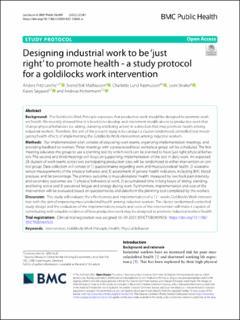Designing industrial work to be ‘just right’ to promote health - a study protocol for a goldilocks work intervention
Lerche, Anders Fritz; Mathiassen, Svend Erik; Rasmussen, Charlotte Lund; Straker, Leon; Søgaard, Karen; Holtermann, Andreas
Journal article, Peer reviewed
Published version
Permanent lenke
https://hdl.handle.net/11250/3055907Utgivelsesdato
2022Metadata
Vis full innførselSamlinger
Sammendrag
Background The Goldilocks Work Principle expresses that productive work should be designed to promote workers’ health. We recently showed that it is feasible to develop and implement modifications to productive work that change physical behaviors (i.e. sitting, standing and being active) in a direction that may promote health among industrial workers. Therefore, the aim of the present study is to conduct a cluster randomised controlled trial investigating health effects of implementing the Goldilocks Work intervention among industrial workers. Methods Our implementation plan consists of educating work teams, organizing implementation meetings, and providing feedback to workers. Three meetings with a preselected local workplace group will be scheduled. The first meeting educates the group to use a planning tool by which work can be planned to have ‘just right’ physical behaviors. The second and third meetings will focus on supporting implementation of the tool in daily work. An expected 28 clusters of work teams across two participating production sites will be randomized to either intervention or control group. Data collection will consist of 1) questionnaires regarding work and musculoskeletal health, 2) wearable sensor measurements of the physical behavior, and 3) assessment of general health indicators, including BMI, blood pressure, and fat percentage. The primary outcome is musculoskeletal health, measured by low back pain intensity, and secondary outcomes are 1) physical behaviors at work, 2) accumulated time in long bouts of sitting, standing, and being active and 3) perceived fatigue and energy during work. Furthermore, implementation and cost of the intervention will be evaluated based on questionnaires and data from the planning tool completed by the workers. Discussion This study will evaluate the effectiveness and implementation of a 12 - weeks Goldilocks Work intervention with the aim of improving musculoskeletal health among industrial workers. The cluster randomized controlled study design and the evaluation of the implementation, results and costs of the intervention will make it capable of contributing with valuable evidence of how productive work may be designed to promote industrial workers’ health.

